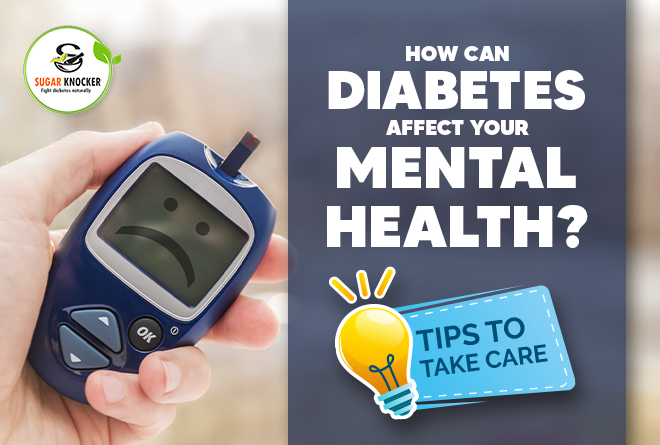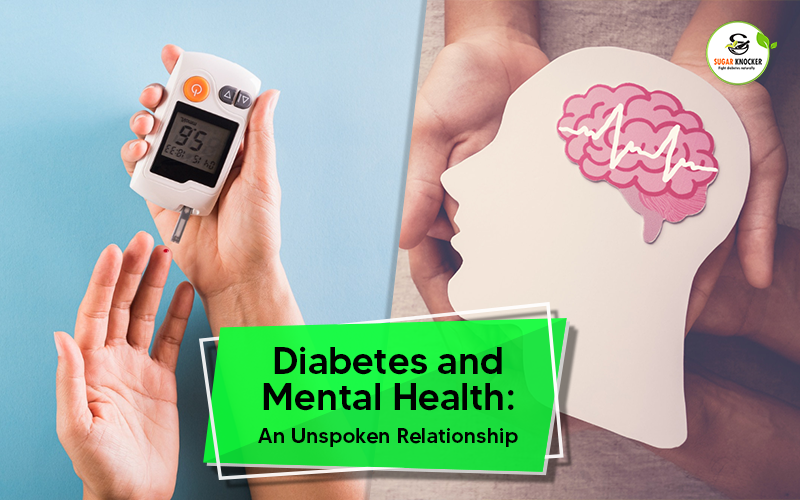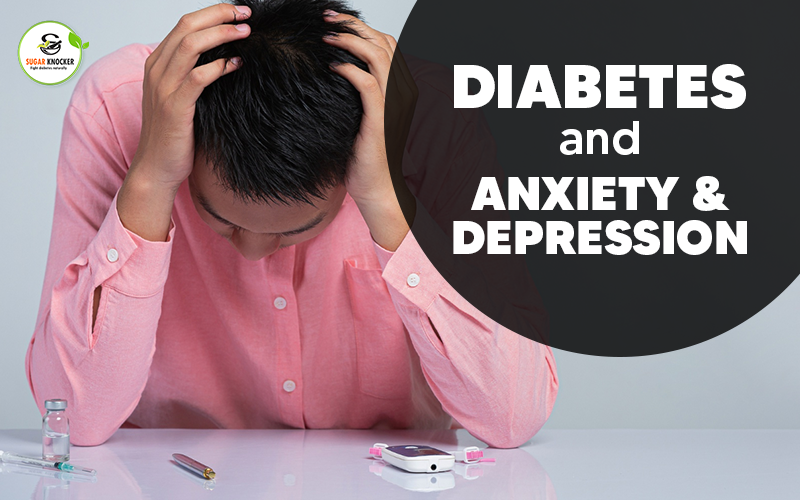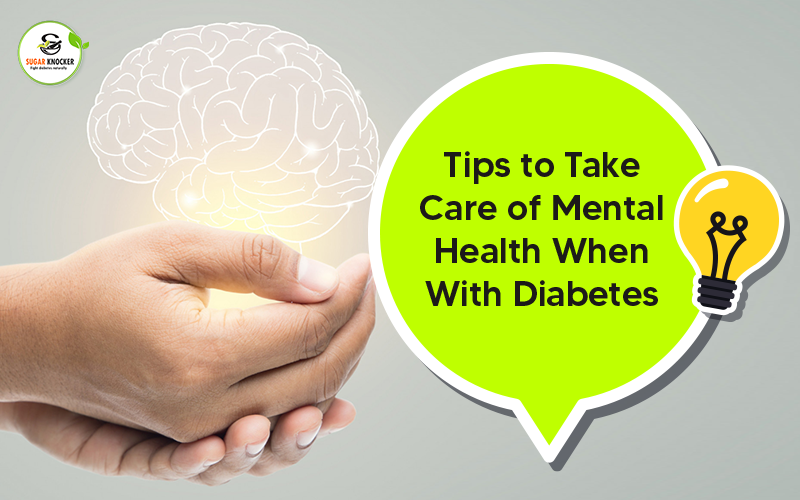
How Can Diabetes Affect Your Mental Health? Tips to Take Care
A medical diagnosis is a life-changing turn for any human. More when it is a condition like diabetes that would stay with you for a long time. It can get complicated for anyone, even with the support of family and friends. Whether it is type 1 diabetes or type 2 diabetes, you would need to make lifestyle changes that you were never ready for once diagnosed.
Type 1 diabetes is where a body stops making insulin, and type 2 diabetes is where the pancreas produces insulin, but that is not sufficient for your needs. In any of the cases mentioned, your life would need a newer and healthier day-to-day routine for the rest of your life ahead. Changing a comfortable lifestyle can get hard on you and your relationships with your near and dear ones. There are some side effects of diabetes, and affected mental health is one of them.
Diabetes and Mental Health: An Unspoken Relationship

To minimize the psychological effects of diabetes it is essential to establish a new healthy routine and good habit. Being aware of your condition, your symptoms, and being cautious all the time can play a crucial role in managing your mental health and diabetes. Just like you take care of taking insulin to manage your blood glucose levels, you must take steps to limit your mental health crises. Diabetes mental health issues are common in people with the condition, and it is common to take precaution measures for your mental and emotional well-being.
Mental health is as important as your physical health. Taking care of your mind is equivalent to leading a healthy life. If you leave your mental health unattended, it can turn to conditions like anxiety and depression that can make your diabetes even worse than it is.
Diabetes and Anxiety & Depression

Being diagnosed with diabetes can affect your mental health conditions that are called diabetes stress in medical terms. Diabetes stress shares similar elements of stress, anxiety, and depression. Stress and depressions are common diabetes mental health issues that can severely affect an individual’s quality of life. Doctors say that the diabetic symptoms might not be severe, but diabetes stress can worsen the conditions if left untreated. Also, the symptoms might not be critical enough for a doctor to diagnose diabetes mental health issues as diabetes stress. Still, the symptoms can continue to affect the quality of life.
The cause of depression, anxiety, and distress might include:
- Worrying about potential complications.
- Controlling the situation.
- Carrying a lot of responsibility towards managing the diabetic condition.
Often people with diabetes feel powerless and stressed in trying to manage this condition. Some people feel anxious about their blood sugar levels being too low or high at all times. Others feel they are not good at managing their diabetic condition and can do a better job. Some people with diabetes always feel anxious about if their blood glucose levels are too high or too low. Some also feel worried about what if they fail to recognize low blood glucose levels and are not quick to avoid dangers and social awkwardness.
Some people with diabetes get distressed by how their family and friends would react to their condition and start treating them differently. Family and friends might get overly involved in trying to manage their exercise regime and diets for them. Many other people with diabetes worry about their potential for employment and their employers.
When you are put on a regular insulin regime, you might begin to worry about missing a dose that could trigger concerns and distress. The need to constantly take medication and keep track of blood sugar levels can interrupt your relaxation and entertainment time, further leading to depression and anxiety.
Unpredicted elements are common psychological effects of diabetes.
For instance, when a person with diabetes takes insulin using an automated pump, they might not be able to fly on an airplane without an authorized letter from the doctor for flying. They would require a doctor’s permit to board and fly in a plane. Situations like these can cause inconvenience and embarrassment.
Diabetes and Mood Swings & Delirium

Diabetes and mood swings come together as a package. Diabetes can transform the mood of a person by causing drastic and severe fluctuations. Low blood glucose levels can trigger symptoms that might cause mood swings like:
- Hunger
- Behavior and personality changes
- Confusion
- Irritability and aggression
- Concentration difficulties
- Decision-making difficulties
- Coordination issues
Mood swings caused by high blood glucose levels include:
- Nervousness
- Difficulty in clear and quick thinking
- Feeling lethargic and being low on energy
Change in blood glucose levels is associated with both diabetes and mood swings. When blood glucose levels are high or low, one might experience mood swings. But, once it gets back to normal levels, the symptoms resolve, and your mood gets back to normal. Irritability and feeling low are results of fluctuating blood glucose levels. Such is the scenario in times when blood glucose levels drop lower than 70 mg/dL. However, some people with diabetes experience a euphoric feeling when suffering from low blood sugar levels. It is a similar feeling to being moderately drunk.
When the blood sugar levels are above 180 mg/dL after eating and 130 mg/dL while fasting, the hyperglycaemia scenario might lead to confusion in people with type 1 diabetes. However, it is less common with people having type 2 diabetes.
Delirium
Delirium is a cause of poorly controlled diabetes in people. When not managed properly, diabetes can cause this worse condition called delirium. It is an acute state of behavior change and confusion which is challenging to treat. Delirium comes along with high risks of cognitive impairment and can even cause death. More importantly, delirium is not often correctly diagnosed, and by the time it is, it gets too late. Time is of the essence in a critical condition like delirium.
Diabetes and Dementia
Studies and researches state that people with diabetes are at a higher risk of developing dementia later in life. One theory that supports the suggestions is that high blood sugar levels cause mental stress that expands and accumulates year after year. Another theory suggests that diabetes compresses blood vessels that reduce blood flow to the brain leading to damaging the brain. Oxygen deprivation can immensely affect the brain and its functions.
[Also Read: Turning Diabetes Into a Positive Force]Tips to Take Care of Mental Health When With Diabetes

Taking care of diabetes mental health issues can be easy if you follow some simple tips. Listed below are some easy-to-follow tips that can help you manage your mental health and diabetes. Let us take a quick look:
- Deal calmly with the news: – Learning that you have been diagnosed with diabetes can leave you sad, upset, and confused. These emotions are understandable. Do not panic at the news and choose it as a sign to do something positive with your lifestyle.
- Gather as much information as possible: – Gathering information about your condition can be a good start. What you first look at as a concern can transform into a solvable situation when you have the information. You can google the information and consult professionals for the best guidance.
- Make plans: – Set small goals towards achieving a healthier lifestyle like regular exercises and healthy eating, and follow them. Break your goals into small fragments and aim at achieving them. Reward yourself at completing your goals and enjoy the road to a healthy lifestyle.
- Be organized: – Diabetes can cause mismanagement and emotional triggers. Try and be organized with your routine, medication, etc.
- Reach out: – Feeling depressed can make you a loner. You might feel cut off from the world. Reach out to friends, family, support groups, your doctor, etc., and communicate your concerns and thoughts. Together you can solve all your concerns and problems.
- Consult a therapist: – Consulting a therapist can give you an outlet for your feelings and emotions. It can be a relaxing experience to have a professional to talk to.
When to See the Doctor? Treatment and Therapies

Seek immediate help if you or anyone you know is experiencing thoughts of harming themselves or having suicidal thoughts. There may be signs of confusion, and one might not be sure of who they are or where they are. In such a scenario, ask them to consult a specialist and seek medical help. A confused state might be a sign of high blood sugar levels or diabetic ketoacidosis.
A person with diabetes might experience depression, fear, anxiety, stress, etc. You should consult a doctor in any situation like this and seek medication. Some medications help you treat anxiety and depression. You should also meet your doctor and review your prescription, as some medicines also contribute to symptoms like stress, depression, and anxiety.
Treatment and Therapies
Mental health is treatable. It just requires a diagnosis on a personal level and consultation with a professional.
- Talk Therapy: – Talking therapy is not just communication. It is also asking questions and discussing problems without hesitation. Only when you are open about your problems, can one find solutions to help.
Other therapies include the following:
- Family Therapy: – Family therapy helps correct bipolar and eating disorders. It helps families to communicate and solve problems and conflicts better.
- Cognitive-behavioral therapy (CBT) – Cognitive-behavioral therapy has two aspects. It helps to build helpful beliefs about life and your condition. The behavioral end allows you to make healthier choices. CBT works well for anxiety, depression, and bipolar disorders. It is also beneficial for other conditions related to mental health.
- Dialectical-behavioral therapy (DBT) – Dialectical-behavioral therapy concentrates on teaching skills like mindfulness, emotional regulation, distress, and impersonal effectiveness.
Healthy Lifestyle Tips

- Diabetes mental health issues can affect your lifestyle only when you allow them to. You can make healthy lifestyle choices, maintain the condition well, and enjoy your life like any other individual. Some examples of healthy lifestyle choices that you can incorporate into your daily lifestyle are listed below. Let us take a look:
- Keep the same routine for your meals: – Eating healthy meals, regular sizes, and maintaining the same time for your eating can be greatly helpful. Eating time and habits help you maintain a stable blood sugar level.
- Regular exercises: – Physical activities like regular exercising help maintain a healthy weight, boost your mood, and maintain stable blood sugar levels. Exercising is also a great way to feel delighted. People with diabetes, mainly those who intake insulin, must check their blood sugar levels before and after any physical activity. Also, start with moderate exercises, and eventually, you can intensify your workouts. Take expert assistance if you try something new.
- Take your medication regularly and on time: – To take your medicines on time every day is a good habit. It will ensure your blood sugar levels are under control, and you would most likely have no mood swings.
- Make small lifestyle changes and expect realistic results: – If you begin making healthy changes to your lifestyle, be patient enough for them to show results. Remember, results take time. Make small changes to your lifestyle instead of transforming your life overnight. Small lifestyle changes are sustainable and can be followed for a lifetime. Also, small changes promote self-confidence and improve your overall well-being.
- Get yourself enrolled in a self-management program for diabetics: – There are several mental and physical healthcare and self-management programs that can help you manage this condition. Seek such assistance and improve your lifestyle. These programs focus on meeting blood glucose level targets, maintaining a healthy weight, and following healthful behaviors.
- Have a support system: – Some people might find it easy to talk to family and friends, while others might like to share concerns with a support group of strangers. Having a dedicated group of people by your side can help you face challenges and lead a happy, stress-free life.
Supporting a Loved One with Diabetes

Diabetes mental health issues have a lot to do with coping with emotional effects. Learning about the condition can help you and your near and dear ones to lead a happier and stress-free life. First and foremost, it is essential to understand why a person with diabetes has mood swings, fears, and anxiety. Listed below are some ways you can help a dear one cope up with diabetes and associated complications. Let us take a look:
- Ask them about how they feel and enquire about their condition: – Communication is often the key to a lot of mental health and diabetes problems. Ask them questions like:-
What troubles you the most?
What can I do to make you feel better?
What can I do to make diabetes more comfortable for you?
Can I help you with your medication?
Should I accompany you to your appointments?
Be a part of their journey, and you will automatically help them fight their depression and diabetes. Showing interest and getting involved makes them feel less burdened and isolated.
- Join them on their healthful programs and activities:- Take a couple of exercise classes together every week or go jogging together. Learn healthy cooking together and enjoy cooking on weekends. Little things of togetherness can help people with diabetes and make them less stressed.
Offer to accompany them on a health checkup appointment:- Another way to help them with diabetes is to accompany them to their health checkup visits. You can go along and jot down questions for the next appointment. Also, you can help them plan things based on the checkup.
- Emphasize listening to them: – A person with diabetes might have a lot to talk about. They might need a listening ear while they share their anxieties and concerns. Be the listener they need in their tough times and offer support.
- Understand their mood swings: – Remember, mood swings are a cause of high or low blood glucose levels. Do not react to such mood swings. Instead, try to calm them in case of any uncomforting sensation and make them feel comfortable and normal.
Talking and supporting someone with diabetes can go a long way in helping them fix their anxieties, fears, mood swings, etc. You can be a helping hand in tough times and make them feel relaxed and calm. People with diabetes reach in varying ways when hit with low or high blood glucose levels. You can help them recognize their specific symptoms. They can use your feedback on symptoms, which would help them fight the psychological effects of diabetes.
Time to Take Care!

If you have a diabetic condition or are family or friend to someone who does, make sure to know more about mental health and diabetes. The more you know, the better you can help. There are various psychological effects of diabetes that you can get rid of by simple measures. The more you read, the more you know. Time is of the essence in the case of mental health and diabetes. Caring for your mind can help you maintain good physical health too.
Seeking help from the experts, developing healthy lifestyle habits, and involving your friends and family can lead you great results in case of mental health and diabetes. Remember, mood swings are a part of diabetic symptoms and outcomes. Just as you manage your blood glucose levels, you can manage your mood swings with help from the experts and people around you. Lastly, it is okay to ask for help and communicate. Communicating and seeking help can help you with your situation and allow you to lead a healthy life!

